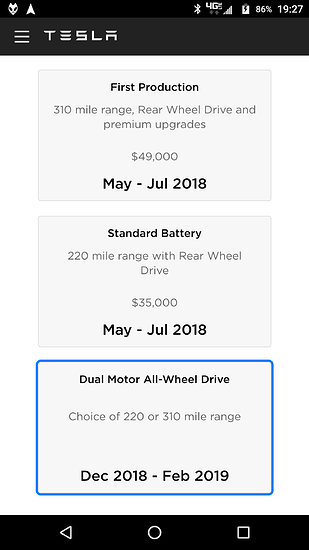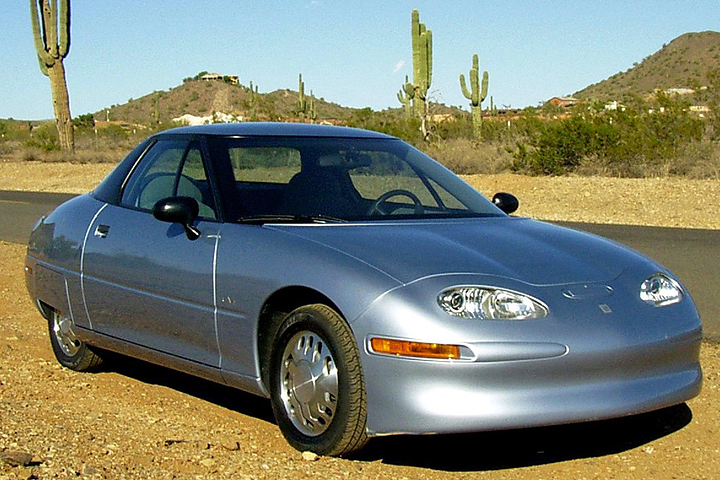Tesla have gearboxes.
Edit: njm corrected me, they are just reduction gears
Gearbox yes. transmission not so much.
Which is where hydrocarbons come in. Store hydrogen in chemical bonds.
Also hydrogen is quite easily produced on demand. Takes about 8 hours to produce enough for a tank. Fill up for a drive you could top up with only an hours worth of hydrogen
As I’ve said virtually all hydrogen is being produced from natural gas - no advantage over fossil fuel. And this won’t change unless electrolysis gets cheaper than natural gas, which won’t happen anytime swoon.
It’s also extremely explosive, and very reactive. Besides, you lose scale efficiency doing it that way
Well said.
No worry if you don’t have one, but I was wondering if you do?
So what. You can regen more power while stopping, though you wont get all of it back, it’s way more efficient then a light gas car.
Model 3 reservation. Which is fully refundable if the 3 flops or if my life changes
Very nice. I have a Nissan Leaf, but I plan on selling it, and getting a Chevy Spark EV. I want that 400 lb-ft of torque.
If you produce energy to charge cars through environmentally friendly means, You can use that energy to produce hydrogen. On a smaller scale everyone can produce hydrogen on their own property. Hell even cars can produce it if designed to. With the benefits of both hydrogen and electric. (Most hydrogen vehicles use fuel cells which power electric motors anyway) Point is hydrogen has a higher energy density and therefore saves on power due to not having to lug around those extra batteries.
Very absolut comment. No, not all hydrocarbons are explosive, many solid hydrocarbons smolder when heated or don’t burn at all. And even though you lose scalability, it’s still far more energy dense than current batteries.
Lithium batteries are significantly behind in energy dencity and the point is the next logical step before electric is hydrogen.
Also read up on hydrogen storage. You might learn something
I mean it’s cool and all… Like I’ve test drive a p85 model S and the acceleration is wicked…
But keep in mind that high torque + heavy car + dude who likes to have fun = bald tires 
Seriously though. Google Tesla tire issues… They go quick on a heavy car. Especially the performance models
As I’ve said, this is not going to happen. Companies don’t care about producing hydrogen the environmentally friendly way. There won’t be a change unless electrolysis gets cheaper than current means, which it won’t unless there’s some serious breakthrough in energy production.
Density sure, but that’s a non issue imho unless you’re in a niche where car storage REALLY matters.
We’ve had electric cars since 2012 and are going to have 500000 more electric cars in the next couple years.
Hydrogen’s adoption is not even close. It may have a place in the future once we get Mass production and safety kinks out of the way but, it will be AFTER electric, as it’s already is…
What’s that you say?
And this ones FWD so it will be extra hard to put the power down.
Do you know how long your wait is for the Model 3?
Small correction we have had electric cars since 1860s, and there was also the Chevy EV1 in 96
That’s legit, I’m so jealous, still quit a long wait though.
Yeah, but you can’t produce enough h2 on demand. You need to have levels of storage. Hydrogen power is logistically impractical. You’re adding an additional step in the power chain, that you don’t need to have, and that causes loss in efficiency.
And yet the loss of efficiency is nothing compared to the cost of moving the extra weight of batteries. (Ignoring the potential situation where electricity is so abundant due to solar farms, it’s inexpensive for the average person)
Also Lithium is not as common as it needs to be. If we keep going down the electric car route, we will end up with a shortage of lithium which will affect the global electronic mobile market. Cars, planes, boats, phones, laptops, you name it. This leads to wars over land with high lithium concentrations (Middle east again) Lithium will become the new crude oil. This is completely ignoring the fact that Lithium batteries are not as safe as compressed hydrogen, let alone their hydrocarbon solid storage options.
And here’s an answer to the logistics issues. Pipe hydrogen through gas lines in a hydrocarbon, much like how we pipe natural gas to homes around the world. Use a catalyst to separate the hydrogen off and into a pressurized tank (Takes only 2-5 minutes in tests), Drive away.The left over gas from the hydrocarbon is then returned to where it was originally converted and reused. Tests surrounding this concept have already taken place in Australia, funded by Hyundai.
Also there are a number of companies producing hydrogen vehicles today for the open market. Including but not limited to Honda, Mercedes, Hyundai and Toyota. Not to mention most car manufacturers are still producing prototype and concept vehicles running off fuel cell and hydrogen combustion engines.
Lastly where does battery powered vehicles leave freight? Busses, Trucks and boats can’t sit around for 10 hours every 3 hours into service just to charge. This a monumental cost to companies who have vehicles in use for more than a few hours in a day. Taxi drivers would have to stop half way through their work day because they are out of charge or have to have a second vehicle just to keep going. Times for freight would rapidly increase. Electric vehicles reliant on batteries is not the perfect answer. Hydrogen is a near perfect in between until we find a safe, high density material to act as a battery. The fact is, you can have your electric vehicles, but switch out the batteries for a hydrogen fuel cell and a hydrogen vessel.
Lithium shortage? Unlikely. Lithium is reusable, and Tesla uses many small cells, with fireproofing between. I really think that you are really behind the times. Tesla super chargers can charge a battery in minutes
But to produce enough batteries for every device in the world currently is one thing, Add cars to that is another,
And yet they still burst into flames.
Which drastically reduces the battery life leading to replacing batteries sooner which in turn need to be remanufactured. Which costs a lot.
But thank you for ignoring half my argument
NOPE. There are less than half the per 125m mile fire rate compared to conventional cars. And the super chargers doesn’t reduce battery life significantly, due to the active cooling used by the Tesla.

